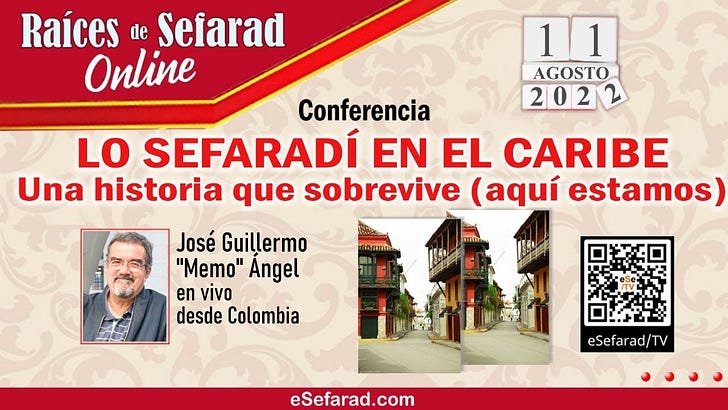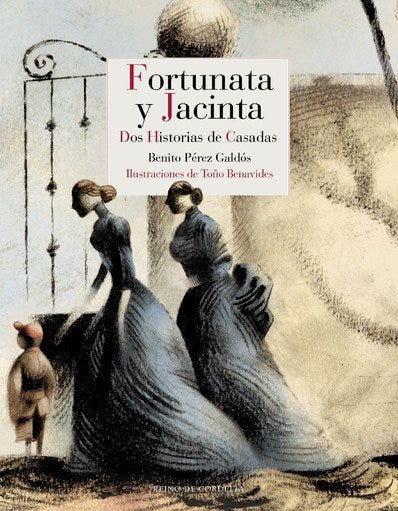Hola. This is Barbara, your curator of cultural news from the Spanish-speaking world. This week I have three topics for you that show how culture travels from one place to another, preserving cultural traits, but also always adapting to the new circumstances. Memo Anjel gave an interesting talk about the Sephardic heritage of the Caribbean. Mario Levy wrote a novel about Jewish life in cosmopolitan Istanbul. And finally, I have a short podcast episode for you in which nobel prize winner Mario Vargas Llosa talks about one of his favourite novels: Pérez Galdós’s Fortunata y Jacinta.
Memo Anjel talks about the Sephardic heritage of the Caribbean
Memo recently gave a talk about the Sephardic heritage of the Caribbean to the listeners of the platform eSefarad. His talk was part of the series «Raíces de Sefarad». I learned many historic details in this excellent presentation. For example, I didn’t know that Jorge Isaacs was a «converso» of English origin. Memo was also very plain in not excluding some pain points of the roles Sephardic people played in the history of the Caribbean, for example, their roles as pirates. He explicitly mentioned Moses Cohen Henriques who was a Dutch pirate of Portuguese Sephardic Jewish origin. Nor did he leave out the involvement of Sephardic businessmen in the slave trade. While the history of Ashkenazim Jews in this region remains rather well documented, that of the Sepharadim is not. Therefore, Memo underlines that this is a work that remains to be done. He himself has contributed to this history with two own books: Abdul Aman y su mujer Isabel Paredes (2015, Abdul Aman and his wife Isabel Paredes) and Aqui te traje el mar (2016, Here I brought you the sea). His talk can be watched:
Istanbul was a fairytale
I am reading the stories of three generations of a Jewish family from the 1920s to the 1980 who all came to live in Istanbul, one of the cultural centres of Sephardic culture in the past. These stories are assembled in the novel Istanbul was a fairytale (İstanbul Bir Masaldı, originally published in Turkish in 1999).
The narrator intervenes a lot in telling these stories by not only including those of his own family, but also those of neighbours, friends and other people from the different ethnic groups in Istanbul. He is not only the narrator, but presents himself as a witness and protagonist of the novel. By reflecting a lot on what he has seen, what he has heard and what might have happened when he was a child or even before he was born, he aims at depicting this community as a vibrant mosaic of memories in which Jews, Greeks, Armenians and Turks co-existed. The characters are portrayed authentically and humanely and show the narrator’s great gift of observation. The nostalgic tone of the book makes it clear that this world that has been lost.
The author Mario Levy (born 1957) is a member of the Sephardic community of Istanbul and knows what he is writing about. As said before, the original language of the novel is Turkish and I am reading the (shortened) German translation from 2009. With 845 pages, it’s still quite a bulky volume. Even though this depicted world of the past is very vibrant and multifaceted, I find the book difficult to read because the text meanders as much through snippets from the lives of the many characters as through lengthy and lyrical reflections on gossip, suggestive remarks, and the sense of story-telling in general. It is indeed a challenging read in comparison to the lightly told straight-forward story of the Netflix series The club, which has a similar historic setting, but a clear plot with characters that are easier to grasp and understand.
If you wish to explore the English translation from 2012, you will have to look for a used copy because it is sold out at the publishing house.
Vargas Llosa loves Fortunata y Jacinta
The newspaper La Vanguardia has started a new podcast title Los libros secretos in which they interview authors to find out more about the books that marked their own writing. The last episode I listened to consisted of an interview with Mario Vargas Llosa about Fortunata y Jacinta, written by Benito Pérez Galdós in 1887. It’s one of the best novels about urban life in 19th century Madrid. It is very interesting to hear what Vargas Llosa finds fascinating about this novel. Despite being eloquent, I got a bit nervous about his so many «digamos» (let’s say) which he uses as an introductory fill-in in almost every sentence. I was wondering whether he uses it so often because in an oral conversation he cannot be that perfect as in writing, i.e. he uses the fill-in to indicate that he tries to get as close as possible to the best phrasing of what he wants to say without reaching the perfection of a written statement. Anyway, his statements are pretty clear and distinct showing his admiration of Pérez Galdós. He only appears a bit evasive when he is asked about the depiction of women’s equality. However, he does not fail to highlight the prominence that the author of the novel gave to the two women who give the novel its title. Here’s the link to the podcast episode: https://www.lavanguardia.com/cultura/20220702/8378421/libro-referencia-vargas-llosa-expresa-sociedad-espanola-todos-traumas-podcast.html
This is all for today. I’ll be back in about two weeks with more news from the Hispanic world.



